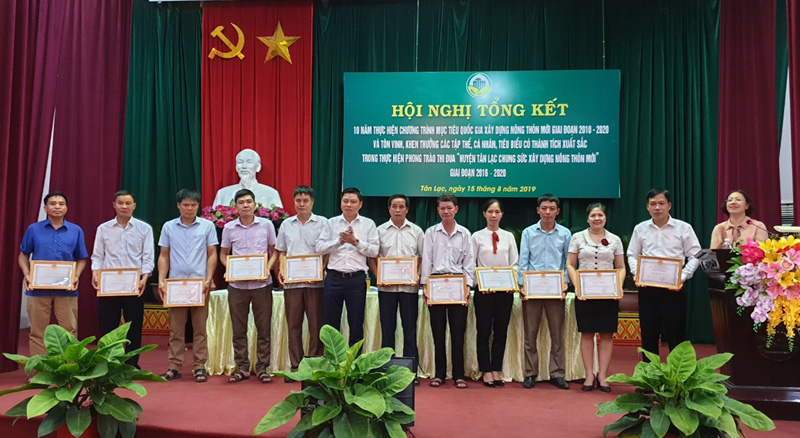


 Leaders of the Tan Lac
People’s Committee present certificates of merit to individuals with great
contributions to the emulation movement of "Tan Lac district people join hands
in building new-style rural areas” in the 2016-2020 period.
Leaders of the Tan Lac
People’s Committee present certificates of merit to individuals with great
contributions to the emulation movement of "Tan Lac district people join hands
in building new-style rural areas” in the 2016-2020 period.
After 10 years of implementing the Target Programme on New-Style Rural Area Building, the district has had six communes completing all the 19 criteria of the programme, bringing the number of average criteria reached to 12.5 per commune, up 7.03 criteria compared to 2010.
The district has paid special attention to developing production and forming connectivity chains to produce and sell red-flesh grapefruits, caged fish, safe vegetable, and Nam Son tangerine.
The locality has supported three cooperatives to join the commercial goods chain. In 2019, per capita income of the district locals reached 43.45 million VND (1,868 USD) per year, up 17.55 million VND per year compared to that in 2010. The poverty rate was brought down to 19.66 percent in 2018 from 39.95 percent in 2010.
For the 2021-2025 period, the district sets major targets, including 10 communes recognised as new-style rural area, two communes reaching the advanced criteria for new-style rural areas, and 10 villages and three communes becoming model new-style rural area.
Per capita income is expected to top 65 million VND per year, while the poverty ratio is hoped to be reduced to 15 percent, and the rate of trained labour is set to reach over 65 percent.
The district will strive for 97 percent of locals joining health insurance, and over 40 percent accessing safe water. At the same time, the locality will ensure and improve the quality of new-style rural area criteria. It is estimated that the district will need over 1.02 trillion VND for the programme in the 2021-2025 period. It has given seven groups of tasks and solutions to complete the goals.
On the occasion, the People’s Committee of Tan Lac presented certificates of merit to 11 outstanding collectives as well as 24 individuals and households in the movement of "Tan Lac district people join hands in building new-style rural areas” in the 2016-2020 period./.